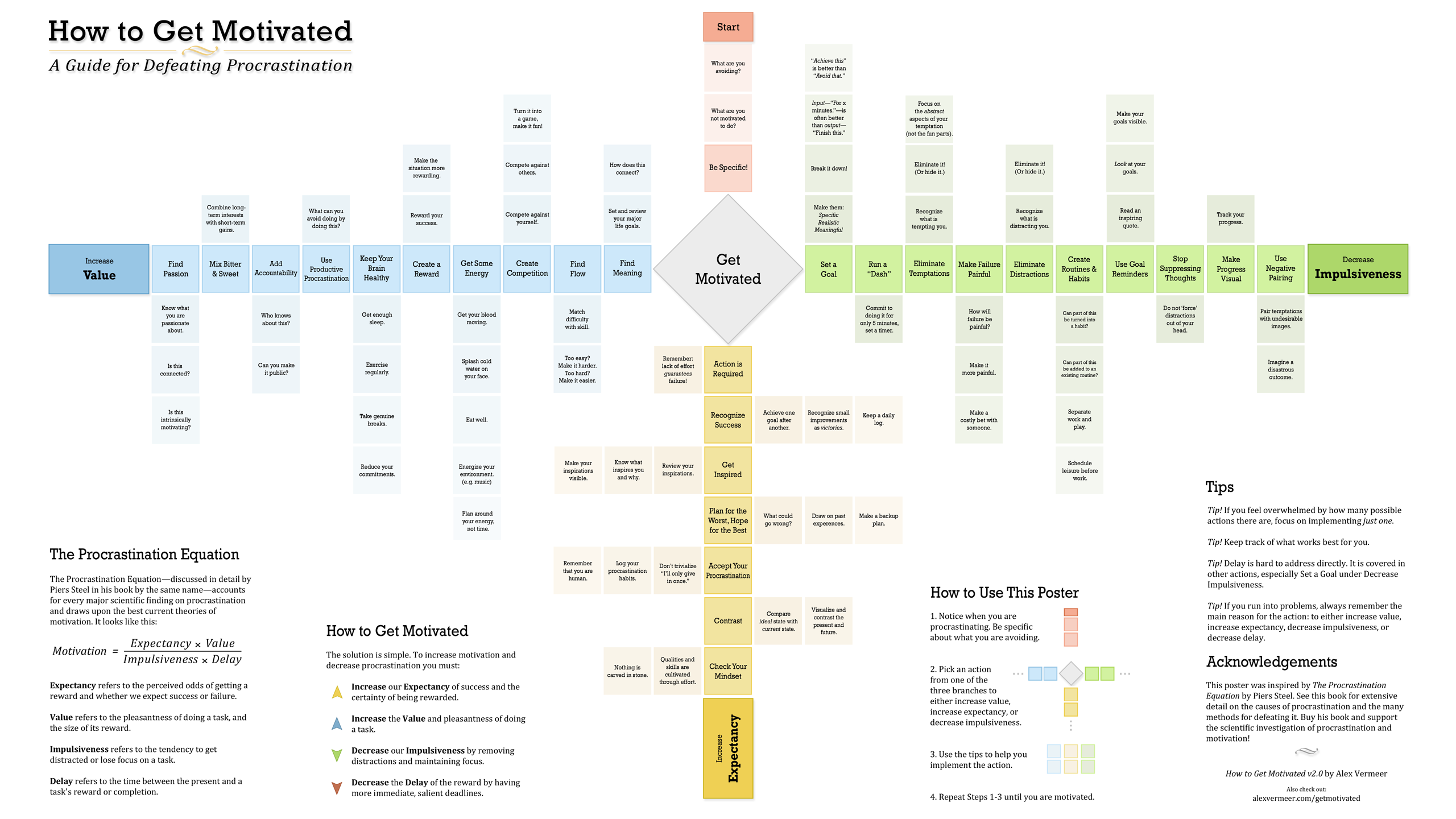How to Beat Procrastination
My own behavior baffles me. I find myself doing what I hate, and not doing what I really want to do!
Saint Paul (Romans 7:15)
The Procrastination Equation
This equation makes intuitive sense:
- Expectancy: as the expectation of success increases, your motivation to do the task increases. Expecting to fail is demoralizing; why do the task if you don’t expect to get anything from it?
- Value: as the value of completing the task increases, the higher reward one receives upon completion, increasing motivation in the short-term.
- Impulsiveness: the less control over impulsive action (i.e. increased impulsiveness), the less we’re able to allocate action toward long-term goals. There’s always something more interesting in the moment to act on, and impulses override planning.
- Delay: the further the task’s expected completion is into the future, the less desire we have to work on it right now. This is the effect of discounted future reward, whereby closer, more certain rewards are prioritized over uncertain long-term rewards. The negative effect of delay is amplified by greater impulsiveness, giving one more time to disregard the task in favor of something more interesting in the short-term.
How to Beat Procrastination
Going straight off the procrastination equation, we can try to adjust parameters over which we have some degree of control to allow for increased motivation. Since we often have little control over the delay/length of a task, we turn to the remaining three variables in the equation:
- Increase expectancy of success
- Increase the task’s value (make it more pleasant and rewarding)
- Decrease impulsiveness
Increasing Expectancy
- Success spirals: by achieving one goal after another, you gain confidence in your ability to succeed. This carries into new tasks and builds momentum moving forward. Designing meaningful but achievable goals makes it possible to experience continuous success and improve expectancy, thereby increasing motivation.
- Mental contrasting: as opposed to imagining the goal you want to achieve directly (e.g. a career, an award, etc), compare it to your current position. The former has been shown to actually drain motivation, while the latter kickstarts motivation by presenting your current situation as an immediate obstacle to overcome.
Increasing Value
- Flow: for boring tasks, make the task more difficult to the point where the level of difficulty matches your skill level. This can make the task more tolerable.
- Meaning: ensure you are mindful of why a task is meaningful, even if it’s only a “link in the chain” toward a meaningful end goal. For example, reading a book -> pass an exam -> get the grade -> get the job -> get the career you desire; reading the book is pretty meaningless without the context of the raw desire at the end of the chain (having a successful career).
- Energy: attempt tasks when you have the most energy. Ensure you have enough energy daily by getting enough sleep and exercising regularly. Among other things:
- Drink lots of water
- Use drugs (especially modafinil) as necessary
- When tired, splash cold water on your face or take a shower or do jumping jacks or go running
- Listen to music that picks up your mood
- De-clutter your life, because clutter is cognitively exhausting for your brain to process all day long
- Rewards: increase the value of a task by rewarding yourself for completing it. It can be helpful to mix long-term goals with short-term ones (i.e. break up large goals into small ones) to allow more frequent, short-term rewards on the way to the larger goal. There is delicate balance to maintain here, however; when you want to build up intrinsic motivation and internal gratification, expecting/needing an external reward can be detrimental. A nice, small discussion as a comment to the original post here.
- Passion: the most powerful way to increase task value is to do what you love wherever possible. These are the pieces that require little convincing; you would do them anyway for their own sake.
Decreasing Impulsiveness
- Commit now: take measures to ensure you will succeed by preventing you from succumbing to your weaknesses. This might include preventing yourself from indulging in entertainment or other distractions (not purchasing a TV, unplugging your router, etc). Additionally, you can make failure very painful. Services like Beeminder allow you to pledge your own money to ensure you stay on track to goals, providing negative reinforcement when you do not succeed. Like reward hacking mentioned above, this can be dangerous, and have adverse effects on motivation.
- Set goals: set reasonable, measurable, achievable goals. Break up large goals into smaller subgoals with shorter timelines. Additionally benefit from routine.
Algorithm for Beating Procrastination
The author of this article has another post on LessWrong detailing an effective formulaic approach to identifying and overcoming procrastination. Briefly, the “algorithm” is as follows:
- Notice the procrastination: pretty easy, when you know a task must or should be done and you find yourself actively avoiding it
- Find out which component of the equation is causing the most trouble: be inquisitive, think about how you feel and why you might be procrastinating. Does the task feel outside of you ability with unlikely success? Do you imagine you be bored by doing the task? What is the timeline of task, and does the reward come after significant delay? Questions like these can help nail the problematic areas.
- Apply methods for attacking the problem identified in Step 2: one of the main goals of the original article was identifying ways to attack each of the possible problematic areas of the procrastination equation. Try the methods above.
- If still procrastinating, go to Step 2: if you’ve addressed a likely issue and are still procrastinating, perhaps there’s another issue to address.
A fantastic, detailed graphic for this procedure (from here):
